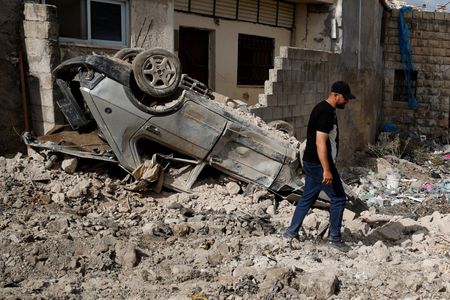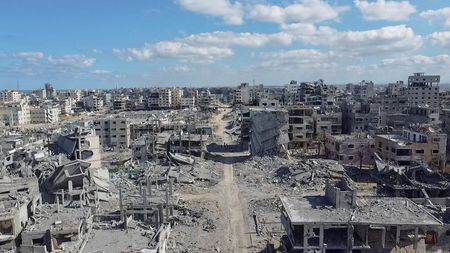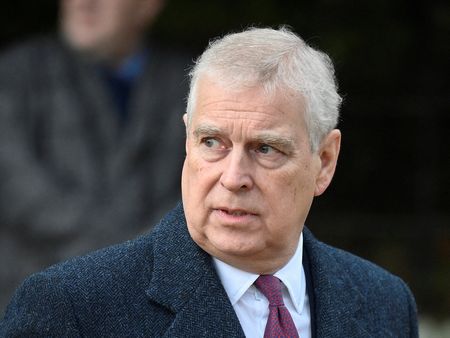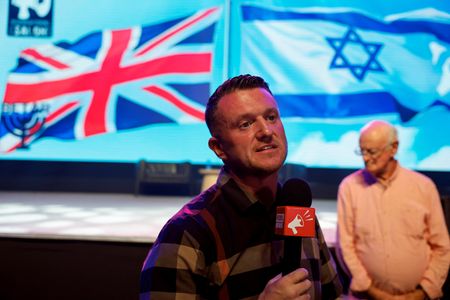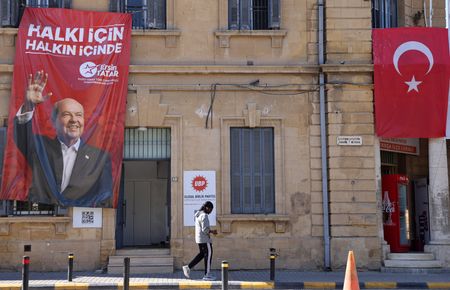JERUSALEM (Reuters) -The Israeli military launched an attack on Gaza on Sunday, Israeli media and residents reported, dimming hopes that a U.S.-mediated ceasefire would lead to lasting peace in the enclave as Israel traded blame with Palestinian militant group Hamas.
Israel’s attacks on Sunday were the most serious test of an already fragile ceasefire, which took effect on October 11.
Palestinians in Gaza told Reuters they heard explosions and gunfire in Rafah in the south of the strip and witnesses separately reported heavy gunfire from Israeli tanks in the eastern town of Abassan near Khan Younis, also in southern Gaza.
Witnesses in Khan Younis heard a wave of airstrikes launched into Rafah early on Sunday afternoon.
An Israeli government spokesperson, when asked for confirmation of the attacks, deferred to the military. The military had no immediate comment.
TWO KILLED IN NORTHERN GAZA AIRSTRIKE
Local health authorities in Gaza said on Sunday two Palestinians were killed in an Israeli airstrike in the eastern Jabalia area of northern Gaza.
The Times of Israel reported that the military was conducting airstrikes in the Rafah area after militants attacked forces there, though it did not cite a source for the information.
An Israeli military official said on Sunday that Hamas had carried out multiple attacks against Israeli forces inside Gaza, including a rocket-propelled grenade attack and a sniper attack against Israeli soldiers.
“Both of the incidents happened in an Israeli-controlled area…This is a bold violation of the ceasefire,” the official said.
Senior Hamas official Izzat Al Risheq said on Sunday that the Palestinian militant group remained committed to the ceasefire, which he accused Israel of repeatedly violating.
Neither Al Risheq nor the Israeli military official made any mention of Sunday’s reported Israeli strikes in Gaza.
The government media office in Gaza said on Saturday that Israel had committed 47 violations after the ceasefire deal, leaving 38 dead and 143 wounded.
“These violations have ranged from direct shooting at civilians, to deliberate shelling and targeting operations, as well as the arrest of several civilians,” the media office statement said.
RAFAH CROSSING TO REMAIN CLOSED
The Israeli government and Hamas have been accusing each other of violations of the ceasefire for days, with Israel saying the Rafah border crossing between Gaza and Egypt will remain closed until further notice.
Rafah has largely been shut since May 2024. The ceasefire deal also includes the ramping up of aid to Gaza, where hundreds of thousands of people were determined in August to be affected by famine, according to the IPC global hunger monitor.
Israel and Hamas have been engaged in a dispute over the return of the bodies of deceased hostages. Israel demanded that Hamas fulfill its obligations in turning over the remaining bodies of all 28 hostages.
Hamas has returned all 20 live hostages and 12 of the deceased and has said it has no interest in keeping the bodies of remaining hostages. The group said the process needs effort and special equipment to recover corpses buried under rubble.
Formidable obstacles to Trump’s plan to end the war still remain. Key questions of Hamas disarming, the governance of Gaza, the make-up of an international “stabilization force”, and moves towards the creation of a Palestinian state have yet to be resolved.
When asked for comment, the U.S. Embassy in Jerusalem referred inquiries to the State Department.
Renewed fighting in Gaza and concerns over the ceasefire pushed key Tel Aviv share indices down nearly 2% on Sunday.
(Reporting by Maayan Lubell, Jaidaa Taha, Muhammad Al Gebaly, Alexander Cornwell and Steven Scheer; Writing by Andrew Mills; Editing by Sharon Singleton)

